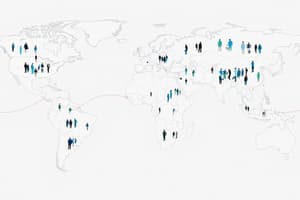Podcast
Questions and Answers
What best describes globalization?
What best describes globalization?
What distinguishes sex from gender in sociological terms?
What distinguishes sex from gender in sociological terms?
Which stage in child development begins with imitation and lacks the ability to understand others' perspectives?
Which stage in child development begins with imitation and lacks the ability to understand others' perspectives?
What is the main focus of structural functionalism?
What is the main focus of structural functionalism?
Signup and view all the answers
What is the primary purpose of resocialization?
What is the primary purpose of resocialization?
Signup and view all the answers
What concept describes a stable state in society where all parts function together effectively?
What concept describes a stable state in society where all parts function together effectively?
Signup and view all the answers
What does the 'looking glass self' imply in Cooley's theory?
What does the 'looking glass self' imply in Cooley's theory?
Signup and view all the answers
What does 'agency' refer to in the context of sociology?
What does 'agency' refer to in the context of sociology?
Signup and view all the answers
What does globalization primarily facilitate?
What does globalization primarily facilitate?
Signup and view all the answers
Which theoretical approach focuses on the interdependence of societal components?
Which theoretical approach focuses on the interdependence of societal components?
Signup and view all the answers
In Symbolic Interactionism, what does the 'I' represent?
In Symbolic Interactionism, what does the 'I' represent?
Signup and view all the answers
Freud's Psychosexual Development theory emphasizes the importance of what in socialization?
Freud's Psychosexual Development theory emphasizes the importance of what in socialization?
Signup and view all the answers
What does Erikson's Psychosocial Stages focus on throughout the lifespan?
What does Erikson's Psychosocial Stages focus on throughout the lifespan?
Signup and view all the answers
What is the goal of rationalization in modern society?
What is the goal of rationalization in modern society?
Signup and view all the answers
The concept of sociological imagination helps to interpret what?
The concept of sociological imagination helps to interpret what?
Signup and view all the answers
Which theorist is NOT associated with Structural Functionalism?
Which theorist is NOT associated with Structural Functionalism?
Signup and view all the answers
How are cultural meanings created and maintained according to social constructionism?
How are cultural meanings created and maintained according to social constructionism?
Signup and view all the answers
What aspect does feminist theory primarily critique in relation to culture?
What aspect does feminist theory primarily critique in relation to culture?
Signup and view all the answers
What does the concept of sociological imagination help individuals understand?
What does the concept of sociological imagination help individuals understand?
Signup and view all the answers
What did Karl Marx co-author in 1848 that significantly influenced political thought?
What did Karl Marx co-author in 1848 that significantly influenced political thought?
Signup and view all the answers
According to social constructionism, what role do language and symbols play in culture?
According to social constructionism, what role do language and symbols play in culture?
Signup and view all the answers
How do women and marginalized groups respond to cultural norms according to feminist theory?
How do women and marginalized groups respond to cultural norms according to feminist theory?
Signup and view all the answers
What does the macro/micro divide in sociology refer to?
What does the macro/micro divide in sociology refer to?
Signup and view all the answers
What is a key focus of cultural studies within the framework of social constructionism?
What is a key focus of cultural studies within the framework of social constructionism?
Signup and view all the answers
What is the primary purpose of content analysis in sociology?
What is the primary purpose of content analysis in sociology?
Signup and view all the answers
Which of the following best describes formal norms?
Which of the following best describes formal norms?
Signup and view all the answers
How are folkways best characterized?
How are folkways best characterized?
Signup and view all the answers
What distinguishes mores from other types of norms?
What distinguishes mores from other types of norms?
Signup and view all the answers
What can be described as the strongest and most deeply held norms?
What can be described as the strongest and most deeply held norms?
Signup and view all the answers
What is a key characteristic of informal norms?
What is a key characteristic of informal norms?
Signup and view all the answers
Which of the following is an example of a formal norm?
Which of the following is an example of a formal norm?
Signup and view all the answers
What role do sanctions play in society?
What role do sanctions play in society?
Signup and view all the answers
What characterizes participant observation in research?
What characterizes participant observation in research?
Signup and view all the answers
What is the primary purpose of content analysis?
What is the primary purpose of content analysis?
Signup and view all the answers
Which approach develops theory from empirical observations?
Which approach develops theory from empirical observations?
Signup and view all the answers
What distinguishes a sample from a population in research?
What distinguishes a sample from a population in research?
Signup and view all the answers
Which statement correctly defines a dependent variable?
Which statement correctly defines a dependent variable?
Signup and view all the answers
What does the Hawthorne effect refer to in a research context?
What does the Hawthorne effect refer to in a research context?
Signup and view all the answers
Informed consent in research emphasizes which key aspect?
Informed consent in research emphasizes which key aspect?
Signup and view all the answers
What is the main focus of primary socialization?
What is the main focus of primary socialization?
Signup and view all the answers
Study Notes
Globalization
- Process that increases interconnectedness across the globe.
- Drives cultural diffusion through trade, migration, and global interaction.
- Impacts economies and social structures internationally.
Rationalization
- The application of logic and effectiveness to all aspects of life.
- Modern societies progress towards organization and systematic decision-making.
- Influences economic practices and performance evaluation.
Social Facts
- External aspects that shape social life.
- Include laws, morals, customs, beliefs, and cultural norms.
Agency
- The capacity to make independent choices and act freely.
- Allows individuals to exert influence on their surroundings.
Sex vs. Gender
- Sex refers to biological differences (male, female, intersex).
- Gender is a social construct related to roles, behaviors, and identities.
Me and I
- Two components of self-reflection:
- "I" represents the spontaneous and individual self.
- "Me" reflects the socialized self, shaped by societal expectations.
Looking-Glass Self
- Developed by Cooley, describes the self-image derived from observing how others perceive us.
- Individuals shape their sense of self based on how they think others see them.
Stages of Self Development
- Preparatory Stage: Imitation without understanding perspectives
- Play Stage: Taking on roles and understanding the perspectives of others.
Symbolic Interactionism
- This theory focuses on how individuals interact through symbols and communication.
- Includes communication, gestures, and language.
Total Institution
- An organization that isolates its members from society.
- Control over daily life, routines, and interactions.
Nature vs. Nurture
- Nature: The influence of genetics on development.
- Nurture: The role of social environment on development.
Resocialization
- The process of replacing old behaviors with new ones.
- Can occur within total institutions or major life transitions.
Rationalism
- A philosophical tradition that seeks to find underlying laws governing reason and truth.
Structural Functionalism
- A theoretical approach that sees society as an interconnected structure with parts fulfilling individual needs.
- Focuses on relationships between social institutions.
- Dynamic equilibrium: all parts working together.
- Interdependence is a central theme, emphasizing the shared principles of societal components.
Social Constructionism
- Argues that culture is a product of social interaction, not an inherent entity.
- Meanings and reality are created through social interaction.
- Language and symbols shape and reinforce the meanings we attach to them.
Feminist Theory
- Critiques cultural structures from the perspective of gender inequality.
- Focuses on how norms, practices, and institutions perpetuate gender-based oppression and maintain patriarchy.
- Examines patriarchal structures as a key factor in cultural perpetuation.
- Emphasizes resistance against cultural norms by women and marginalized groups through activism, art, and alternative media.
- Focuses on how individuals and communities reclaim their culture to challenge narratives about identity, body, and empowerment.
Sociological Imagination
- Developed by C. Wright Mills, this approach connects personal experiences to broader social contexts.
- Enables individuals to view personal troubles as social issues emanating from social structures.
- Allows for the examination of "private troubles of milieu" as "public issues of social structure" and vice versa.
Karl Marx
- Prominent German philosopher and economist.
- Co-authored The Communist Manifesto, a profound political text.
- His theory of society challenged the ideas of Comte.
Content Analysis
- A research method for analyzing textual data.
- Relies on quantitative data derived from patterns and frequencies observed in the text.
- Used by researchers for various purposes like studying media representations, understanding political discourse, and exploring cultural trends.
Social Control
- Mechanisms used to ensure conformity to cultural norms.
- Involves sanctions, which are punishments or rewards for adherence or violation of norms.
Norms
- Established rules and expectations that govern behavior within a society.
- Include both formal and informal norms.
Formal Norms
- Written and established rules, often with consequences for violations.
- Examples include laws, company policies, and school rules.
Informal Norms
- Unwritten, casual behaviors widely accepted by a group.
- Learned through observation, imitation, and socialization.
- Include social customs, etiquette, and traditions.
Mores
- Norms holding strong moral significance.
- Deeply rooted in social values and principles.
- Violating them can result in serious consequences.
- Example: murder, which is considered immoral and punishable by law.
Folkways
- Norms without moral implications based on social preferences.
- Guide appropriate behavior in everyday practices and cultural expressions.
- Examples: wearing a tie to a formal event or greeting someone with a handshake.
Taboos
- Actions that are strongly forbidden due to sacred or moral beliefs.
- Violating them evokes deep revulsion and serious consequences.
- Examples: incest, cannibalism.
Studying That Suits You
Use AI to generate personalized quizzes and flashcards to suit your learning preferences.
Related Documents
Description
Explore key concepts in sociology such as globalization, rationalization, social facts, agency, and the difference between sex and gender. This quiz will help you understand the fundamental ideas that shape social structures and individual identities. Test your knowledge on how these elements interact and influence society.




